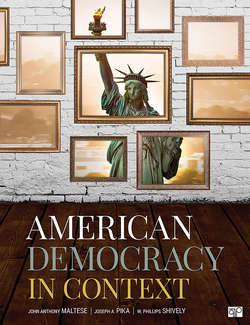Читать книгу American Democracy in Context - Joseph A. Pika - Страница 148
На сайте Литреса книга снята с продажи.
The Natural Rights Tradition
ОглавлениеThe United States has a long natural rights tradition. Natural rights are those basic, fundamental rights that all human beings are entitled to, whether the government recognizes them or not. The English philosopher John Locke identified life, liberty, and property as the quintessential natural rights. Thomas Jefferson borrowed from Locke when he wrote the Declaration of Independence. Some of those who opposed the addition of a Bill of Rights to the Constitution were afraid that an enumeration of rights would suggest that no unenumerated rights existed. Thus, the Bill of Rights ended up including the Ninth Amendment: “The enumeration in the Constitution, of certain rights, shall not be construed to deny or disparage others retained by the people.” Some people see this as a textual justification for the Supreme Court to recognize and enforce unenumerated rights. Others argue that the Ninth Amendment was only meant to allow states to go further in recognizing rights than the federal government: Lack of an enumerated right in the Constitution did not mean that it could not be recognized by a state.
natural rights Basic rights that all human beings are entitled to, whether or not they are formally recognized by the government.
Still others have asked a more fundamental question: Do natural rights exist at all? Even if they do, should a simple majority of the Supreme Court be entrusted with discovering them? To do so might open the door to judicial policy making. For example, in the early part of the twentieth century, a majority of the Supreme Court read economic rights into the Constitution and used them to strike down government regulations of business such as minimum wage laws, maximum hour laws, and child labor laws. Since 1937, when the Supreme Court overturned that line of decisions, the majority of the Court has viewed the decisions in those cases as misguided—an attempt by the Court majority to impose its policy judgments on everyone else.
Ultimately your enthusiasm (or disdain) for reading rights into the Constitution and then using them to strike down legislation may depend upon what you think about the legislation in question. If you like the legislation that is struck down, it is easy to accuse the Court of unjustifiable judicial activism. If you don’t like the law, it is easy to praise the Court for vindicating natural rights.
